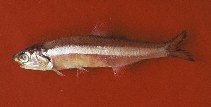| Family: |
Engraulidae (Anchovies), subfamily: Engraulinae |
| Max. size: |
14.5 cm TL (male/unsexed); max.weight: 21.3 g |
| Environment: |
pelagic-neritic; brackish; marine; depth range - 35 m |
| Distribution: |
Western Atlantic: Antilles, Trinidad south to Brazil; also Venezuela to Panama and Honduras but not Gulf of Mexico. Meristic data tends to support three geographic units: South America (east Colombia, Venezuela south to Brazil); Antillean (and some islands off Venezuela); West Caribbean (Gulf of Honduras). |
| Diagnosis: |
Dorsal spines (total): 0-0; Anal spines: 0-0; Anal soft rays: 17-21. Snout long and pointed, only slightly less than eye diameter; maxilla long, tip pointed, reaching almost to gill opening, teeth near tip somewhat enlarged; gill cover canals of panamensis-type; pseudobranch longer than eye diameter, with 30 or more filaments, extending onto inner face of operculum. First pectoral fin ray filamentous. Silver stripe along flank about eye diameter. |
| Biology: |
A schooling species occurring in coastal waters. Trawled down to 25 m off Brazil, but equally taken in shore seines and recorded in salinities of 7.94-8.21 ppt in the Canal de Santa Cruz, Pernambuco, Brazil (Ref. 189). |
| IUCN Red List Status: |
Least Concern (LC); Date assessed: 24 August 2012 Ref. (130435)
|
| Threat to humans: |
harmless |
Source and more info: www.fishbase.org. For personal, classroom, and other internal use only. Not for publication.
